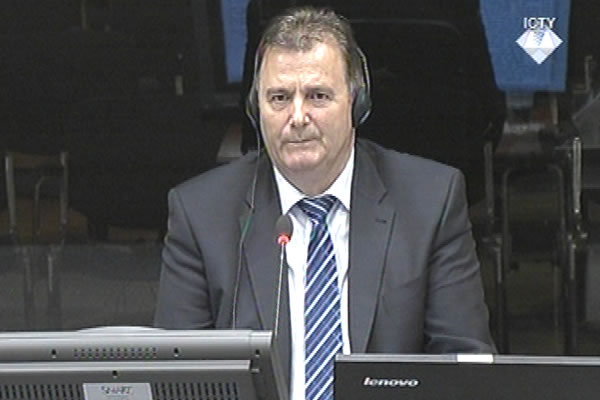Home
WHAT HAPPENED TO PRIJEDOR MEDICAL DOCTORS?
In his evidence in Ratko Mladic’s defense, former ambulance driver in Prijedor Goran Dragojevic was unstinting in his praise for the non-Serb medical doctors he had worked with. Asked if he knew that many of them ended up detained or killed, Dragojevic first said that he didn’t know anything about that. Eventually, he did admit that they had ‘suffered’. He didn’t know the details because in May 1992 he was wounded and sent to Belgrade for medical treatment
 Goran Dragojević, defence witness at Rako Mladic trial
Goran Dragojević, defence witness at Rako Mladic trial In the spring of 1992, defense witness Goran Dragojevic was wounded when the ambulance he was driving came under fire. The incident occurred in the early morning of 30 May 1992 when a group of armed Muslim and Croat citizens in Prijedor tried to ‘liberate’ the town. One month earlier, the Serbian Democratic Party seized power in Prijedor. Dragojevic sustained 32 gunshot wounds and was transferred to Belgrade for medical treatment. The witness did not return to Prijedor until 1994.
In his statement to Ratko Mladic’s defense and in his evidence, the witness described several incidents in Prijedor. According to him, the Serbs attacked Hambarine on 22 May 1992 and Kozarac two days later. The attacks had occurred after the civilians had left the villages. Todorovic also said that in an area called Brdo near Prijedor, Slavko Ecimovic had been training his group which attacked Prijedor on 30 May 1992. Their plan was to seize all key facilities, such as the police station, the barracks and the hotel.
Asked about how he had learned all that, the witness said that he got most of the information upon his return from Belgrade in 1994, from the Kozarski vijesnik newspaper and from talking to people in bars. This prompted presiding judge Orie to raise his concern that Dragojevic’s evidence was a reconstruction of events, not based on first-hand knowledge.
At the end of the cross-examination, the witness got emotional as he spoke through tears about his pre-war friendship with Muslim neighbors, their joint celebrations, walks by the riverside, the assistance he was able to give them during the war and their dedication to come to his aid when he was wounded. Despite all that, the witness was unable to say anything about their fate. When presiding judge Orie asked him if he heard that some medical doctors from Prijedor had been detained and murdered, Dragojevic replied that when he returned from medical treatment he only heard that some of them ‘stopped working’, nothing more.
In the cross-examination, the prosecutor confronted the witness with the facts about what happened to the non-Serb medical staff in the Prijedor Hospital. Esad Sadikovic, a world-renowned specialist, was detained and killed in the Omarska prison camp. Zeljko Sikora and Osman Mahmuljin met a similar fate. Although in the examination-in-chief the witness presented a detailed ‘reconstruction’ of various events in which he had played no part, now he merely stated he had no knowledge of the doctors’ fate. In late May 1992, the witness was away receiving medical treatment. Dr. Mahmuljin was ‘like a brother’ to him, the witness explained, but he nevertheless never thought to ask anyone what had happened to Mahmuljin.
Several questions later, the witness did admit that those medical doctors had been ‘killed’ in Prijedor. This prompted the presiding judge to note that his evidence contradicted the statement he had made scant minutes before, when he said that that as far as he knew the medical doctors simply ‘stopped working’. The witness was cautioned to tell the judges everything he knew, not only to speak about ‘the good and nice things’ that happened to the non-Serb medical doctors in Prijedor.
The witness agreed with the prosecutor’s suggestion that picking out, detaining and killing eminent Muslim and Croat medical doctors had a ‘destructive effect’ on the non-Serb population in Prijedor.
Although in the examination-in-chief the witness specified a number of details about the Serb attacks on the villages of Hambarine and Kozarac, when he was examined by the prosecutor Dragojevic claimed he knew nothing about the men being separated from the rest of the population and their eventual transfer to the Keraterm prison camp. At the time, Dragojevic didn’t even know that anyone was held in Keraterm. The prison camp was as many as two kilometers from his home, and this is why he could not have known anything about it.
Linked Reports
- Case : Mladic
- 2015-05-13 WAR CRIMES IN 'VACUUM'
- 2015-05-12 WHO WERE THE VICTIMS OF ORIC'S ATTACK ON BIJELOVAC: CIVILIANS OR SOLDIERS?
- 2015-05-12 WAS PECANAC MLADIC'S MAN FOR 'SPECIAL TASKS'?
- 2015-05-18 WHAT DID MLADIC'S ARMY WANT TO ACHIEVE?
- 2015-05-19 PUBLIC DECEIVED ABOUT 'DEFENSIVE' MILITARY ACTIONS
- 2015-05-20 WHERE WAS MLADIC IN THE EVENING ON 16 JULY 1995?
